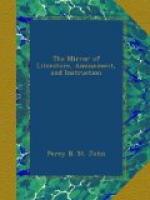[1] Like the ancient Jews
and Persians, the Druids had a sacred and
inextinguishable
fire, which was preserved with the greatest
care.
At Kildare it was guarded, from the most remote antiquity,
by
an order of Druidesses, who were succeeded in later
times by
an
order of Christian Nuns. The fire was fed with
peeled wood,
and
never blown with the mouth, that it might not be polluted.
[2] “On the west front
of the tower are two arches, one within the
other
in relief. On the point of the outermost is a
crucifix,
and
between both, towards the middle, are figures of the
Virgin
Mary
and St. John, the latter holding a cup with a lamb.
The
outer
arch is adorned with knobs, and within both is a small
slit
or loop. At the bottom of the outer arch are two
beasts
couchant.
If one of them by his proboscis was not evidently
an
elephant,
I should suppose them the supporters of the Scotch
arms.
Parallel with the Crucifix are two plain stones, which
do
not
appear to have had anything upon them. Here is
not the least
trace
of a door in these arches, nor anywhere else, except
in
the
church.”
* * * * *
SOME ACCOUNT OF STIRBITCH FAIR.
By A septuagenarian.
(For the Mirror.)
(Stirbitch Fair, as our correspondent observes, was once the Leipsic or Frankfurt of England. He has appended to his “Account” a ground plan of the fair, which we regret we have not room to insert; the gaps or spaces in which, serve to show how much this commercial carnival (for such it might be termed) has deteriorated; for the remaining booths were built on the same site as during the former splendour of the fair. Our correspondent accounts for this “decay, by the facilities of roads and navigable canals for the conveyance of goods;” the shopkeepers, &c, “being able to get from London and the manufacturing districts, every article direct, at a small expense, the fair-keepers find no market for their goods, as heretofore.” His paper is, however, a curious matter-of-fact description of Stirbitch, “sixty years since.” We have been compelled to reject all but one verse of the “Chaunt,” on account of some local allusions, the justice of which we do not deny, but which are scarcely delicate enough for our pages.
Stirbitch is still a festival of considerable extent, although it has lost so much of its commercial importance. There are but few fortnight fairs left: Portsmouth, we recollect, lasts 14 days, and there is a fair held on some fine downs in Dorsetshire, which extends to that period.)
Stirbitch Fair is held in a large field near Barnwell, about two miles from Cambridge, covering a space of ground upwards of two miles in circumference. It commences on the 16th day of September, and continues till the beginning of October, for the sale of all kinds of manufactured and other goods, and likewise for horses.




